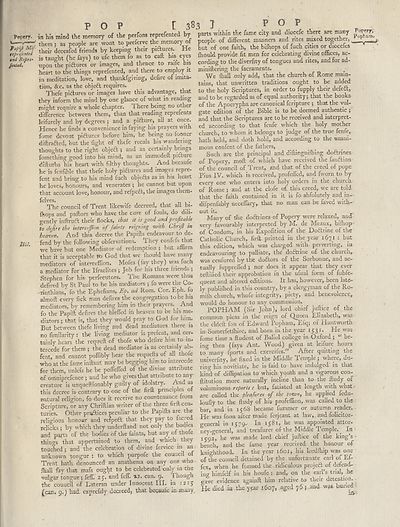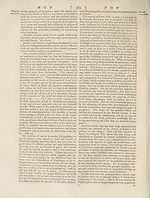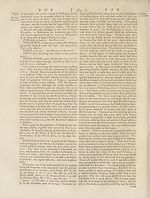Encyclopaedia Britannica > Volume 15, PLA-RAM
(427) Page 383
Download files
Complete book:
Individual page:
Thumbnail gallery: Grid view | List view

POP l
Papery, in his mind the memory of the perfons reprefentcd by
•' them; as people are wont to preferve the memory of
their deceafed friends by keeping their pidures. He
is taught (he fays) to ufe them fo as to call his eyes
Jtnitd. upon the pictures or images, and thence to rane his
heart to the things reprefented, and there to employ it
in meditation, love, and thankfgiving, defire of imita¬
tion, &c. as the objeft requires.
Thefe pi&ures or images have this advantage, that
they inform the mind by one glance of what in reading
might require a whole chapter. 1 here being no other
difference between them, than that reading reprefents
leifurely and by degrees ; and a pifture, all at once.
Hence he finds a convenience in faying bis prayeis with
fome devout pictures before him, he being no fooner
diftradted, but the light of thefe recals his wandering
thoughts to the right objedl ; and as. certainly brings
fomething good into his mind, as an immodeft picture
difturbs his heart with filthy thoughts. And becaufe
he is fenfible that thefe holy piaures and images repre-
fent and bring to his mind iuch objeas as in his heart
he loves,-honours, and venerates ; he cannot but upon
that account love, honour, and refpedt, the images them-
felves.
The council of Trent likewife decreed, that all bi-
fhops and paflors who have the cure of fouls, do dili¬
gently inftrua their flocks, that it is good and profitable
to dejit e the inter a-(ft on of faints reigning ivrth Chrifl in
heaven. And this decree the. Papifts endeavour to de-
21U fend by the following obfervations. 1 hey confcfs that
we have but one Mediator of redemption ; hut affiim
that it is acceptable to God that we fhould have many
mediators of interceifion. Mofes (fay they) was fuch
a mediator for the Ifraelites; Job for his three friends ;
Stephen for his perfecutors. The Romans were thus
defired by St Paul to be his mediators ; fo were the Co¬
rinthians, fo the Ephefians, JSp. ad Rom. Cor. Eph. fo
almofl every' fick man defires the congregation tube his
mediators, by remembering him in their prayers. . And
fo the Papift defires the bleffed in heaven to be his me¬
diators ; that is, that they would pray to. God for him.
But between thefe living and dead mcdiatois there is
no fimilarity : the living mediator is prtfent, and cer¬
tainly hears the requeft of thofe who defire him to in*
tercede for them ; the dead mediator is as certainly ab-
fent, and cannot poffibly hear the requeits of all thole
who at the fame inilant may be begging him to intercede
for them, unlefs he be pofTeffed of the divine attribute
of omniprefence ; and he who gives that attribute to any
creature is unqueftionably guilty idolatry. And as
this decree is contrary to one of the firll princip es of
natural religion, fo does it receive no countenance fiom
Scripture, or any Chriftian writer of the three fii it cen¬
turies. Other practices peculiar to the Papifts are the
religious honour and relpeft that they pay to faci ed
relicks; by which they underfland not only the bodies
and parts cf the bodies of the faints, but any of thofe
things that appertained to them, and which they
touched ; and the celebration of divine fervice in an
unknown tongue : to which purpofe the council of
Trent hath denounced an anathema on any one who
fhall fay that mafs ought to he celebrated only, in the
vulgar tongue; feff. 25. an<i 2-2, can’ 9* ^ hough
the council of Lateran under Innocent III. in 1215
/can* 9.) had. exprefsly decreed, that becauie in many
^ ] POP
parts within the fame city and dioccfe there are many
people of different manners and rites mixed together, —..a
but of one faith, the hifhops of fuch cities or diocefes
fhould provide fit men for celebrating divine offices, ac¬
cording to the diverfity of tongues and rites, and for ad-
miniftering the facraments.
We fhall only add, that the church of Rome main¬
tains, that unwritten traditions ought to be added
to the holy Scriptures, in order to fupply their defett,
and to be regarded as of equal authority; that the books
of the Apocrypha are canonical fcripture ; that the vul-
gate edition of the Bible is to be deemed authentic ;
and that the Scriptures are to be received and interpret¬
ed according to that fenfe which the holy mother
church, to whom it belongs to judge of the tiue fenfe,
hath held, and doth hold, and according to the unani¬
mous confent of the fathers,
Such are the principal and diflinguifliing doftrines
of Popery, moft of which have received the fainftion
of the council of Trent, and that of the creed of pope
Pius IV. which is received, profeffed, and fworn to by
every one who enters into holy oiders in the church
of Rome ; and at the clofe of this creed, we are told
that the faith contained in it is fo abfolutely and in-
difpenfably neceffary, that no man can be faved with¬
out it.
Many of the dodtrines of Popery were relaxed, and
very favourably interpreted by M. de Meaux, bifhop
of Condom, in his Expofition of the Do&rine of the
Catholic Church, firft printed in the year 1671 : but
this edition, which was charged with perverting, in
endeavouring to palliate, the dodfrine of the church,
was cenfured by the dodtors of the Sorbonne, and ac¬
tually fupprefied ; nor does it appear that they ever
teflified their approbation in the ufual form of fubfe-
quent and altered editions. It has, however, been late¬
ly publiflied in this country, by a clergyman of the Ro-
mifh church, whofe integrity, piety, and benevolence,
would do honour to any communion.
POPHAM (Sir John), lord chief juftice of the
common pleas in the reign of Queen Elizabeth, was
the eldefl fon of Edward Popham, ECq; of Huntworth
in Somerfetfhire, and horn in the year 15 3 1 • He was
fome time a Undent of Baliol college in Oxford ; “ be¬
ing then (fays Ant. Wood) given at leifure hours
to many fports and exercifes.” After quitting the
univerfity, he fixed in the Middle Temple; where, du¬
ring his novitiate, he is faid to have indulged in that
kind of diffipation to which youth and a vigorous con-
ftitution more naturally incline than to the ftudy of
voluminous reports : hut, faliated at length with what
are called the pleafures of the town, he applied fedu-
loufiy to the ftudy of his profeffion, was called to the
bar, and in 1568 became fummer or autumn reader.
He was foon after made ferjeant at law, and folicitor-
general in 1579- In 1581, he was appointed attor-
ney-general, and treafurer of the Middle Temple. In
1592, he was made lord chief juftice of the king’s^
bench, and the fame year received the honour of
knighthood. In the year 1601, his lordftiip was one
of the council detained by the unfortunate earl of Ef-
fex, when he formed the ridiculous project of defend¬
ing himfelf in his houfe : and, on the earl’s trial,, he
gave evidence againft him relative to their detention.
He died in the year 1607, aged 76 ; and was buried
Papery, in his mind the memory of the perfons reprefentcd by
•' them; as people are wont to preferve the memory of
their deceafed friends by keeping their pidures. He
is taught (he fays) to ufe them fo as to call his eyes
Jtnitd. upon the pictures or images, and thence to rane his
heart to the things reprefented, and there to employ it
in meditation, love, and thankfgiving, defire of imita¬
tion, &c. as the objeft requires.
Thefe pi&ures or images have this advantage, that
they inform the mind by one glance of what in reading
might require a whole chapter. 1 here being no other
difference between them, than that reading reprefents
leifurely and by degrees ; and a pifture, all at once.
Hence he finds a convenience in faying bis prayeis with
fome devout pictures before him, he being no fooner
diftradted, but the light of thefe recals his wandering
thoughts to the right objedl ; and as. certainly brings
fomething good into his mind, as an immodeft picture
difturbs his heart with filthy thoughts. And becaufe
he is fenfible that thefe holy piaures and images repre-
fent and bring to his mind iuch objeas as in his heart
he loves,-honours, and venerates ; he cannot but upon
that account love, honour, and refpedt, the images them-
felves.
The council of Trent likewife decreed, that all bi-
fhops and paflors who have the cure of fouls, do dili¬
gently inftrua their flocks, that it is good and profitable
to dejit e the inter a-(ft on of faints reigning ivrth Chrifl in
heaven. And this decree the. Papifts endeavour to de-
21U fend by the following obfervations. 1 hey confcfs that
we have but one Mediator of redemption ; hut affiim
that it is acceptable to God that we fhould have many
mediators of interceifion. Mofes (fay they) was fuch
a mediator for the Ifraelites; Job for his three friends ;
Stephen for his perfecutors. The Romans were thus
defired by St Paul to be his mediators ; fo were the Co¬
rinthians, fo the Ephefians, JSp. ad Rom. Cor. Eph. fo
almofl every' fick man defires the congregation tube his
mediators, by remembering him in their prayers. . And
fo the Papift defires the bleffed in heaven to be his me¬
diators ; that is, that they would pray to. God for him.
But between thefe living and dead mcdiatois there is
no fimilarity : the living mediator is prtfent, and cer¬
tainly hears the requeft of thofe who defire him to in*
tercede for them ; the dead mediator is as certainly ab-
fent, and cannot poffibly hear the requeits of all thole
who at the fame inilant may be begging him to intercede
for them, unlefs he be pofTeffed of the divine attribute
of omniprefence ; and he who gives that attribute to any
creature is unqueftionably guilty idolatry. And as
this decree is contrary to one of the firll princip es of
natural religion, fo does it receive no countenance fiom
Scripture, or any Chriftian writer of the three fii it cen¬
turies. Other practices peculiar to the Papifts are the
religious honour and relpeft that they pay to faci ed
relicks; by which they underfland not only the bodies
and parts cf the bodies of the faints, but any of thofe
things that appertained to them, and which they
touched ; and the celebration of divine fervice in an
unknown tongue : to which purpofe the council of
Trent hath denounced an anathema on any one who
fhall fay that mafs ought to he celebrated only, in the
vulgar tongue; feff. 25. an<i 2-2, can’ 9* ^ hough
the council of Lateran under Innocent III. in 1215
/can* 9.) had. exprefsly decreed, that becauie in many
^ ] POP
parts within the fame city and dioccfe there are many
people of different manners and rites mixed together, —..a
but of one faith, the hifhops of fuch cities or diocefes
fhould provide fit men for celebrating divine offices, ac¬
cording to the diverfity of tongues and rites, and for ad-
miniftering the facraments.
We fhall only add, that the church of Rome main¬
tains, that unwritten traditions ought to be added
to the holy Scriptures, in order to fupply their defett,
and to be regarded as of equal authority; that the books
of the Apocrypha are canonical fcripture ; that the vul-
gate edition of the Bible is to be deemed authentic ;
and that the Scriptures are to be received and interpret¬
ed according to that fenfe which the holy mother
church, to whom it belongs to judge of the tiue fenfe,
hath held, and doth hold, and according to the unani¬
mous confent of the fathers,
Such are the principal and diflinguifliing doftrines
of Popery, moft of which have received the fainftion
of the council of Trent, and that of the creed of pope
Pius IV. which is received, profeffed, and fworn to by
every one who enters into holy oiders in the church
of Rome ; and at the clofe of this creed, we are told
that the faith contained in it is fo abfolutely and in-
difpenfably neceffary, that no man can be faved with¬
out it.
Many of the dodtrines of Popery were relaxed, and
very favourably interpreted by M. de Meaux, bifhop
of Condom, in his Expofition of the Do&rine of the
Catholic Church, firft printed in the year 1671 : but
this edition, which was charged with perverting, in
endeavouring to palliate, the dodfrine of the church,
was cenfured by the dodtors of the Sorbonne, and ac¬
tually fupprefied ; nor does it appear that they ever
teflified their approbation in the ufual form of fubfe-
quent and altered editions. It has, however, been late¬
ly publiflied in this country, by a clergyman of the Ro-
mifh church, whofe integrity, piety, and benevolence,
would do honour to any communion.
POPHAM (Sir John), lord chief juftice of the
common pleas in the reign of Queen Elizabeth, was
the eldefl fon of Edward Popham, ECq; of Huntworth
in Somerfetfhire, and horn in the year 15 3 1 • He was
fome time a Undent of Baliol college in Oxford ; “ be¬
ing then (fays Ant. Wood) given at leifure hours
to many fports and exercifes.” After quitting the
univerfity, he fixed in the Middle Temple; where, du¬
ring his novitiate, he is faid to have indulged in that
kind of diffipation to which youth and a vigorous con-
ftitution more naturally incline than to the ftudy of
voluminous reports : hut, faliated at length with what
are called the pleafures of the town, he applied fedu-
loufiy to the ftudy of his profeffion, was called to the
bar, and in 1568 became fummer or autumn reader.
He was foon after made ferjeant at law, and folicitor-
general in 1579- In 1581, he was appointed attor-
ney-general, and treafurer of the Middle Temple. In
1592, he was made lord chief juftice of the king’s^
bench, and the fame year received the honour of
knighthood. In the year 1601, his lordftiip was one
of the council detained by the unfortunate earl of Ef-
fex, when he formed the ridiculous project of defend¬
ing himfelf in his houfe : and, on the earl’s trial,, he
gave evidence againft him relative to their detention.
He died in the year 1607, aged 76 ; and was buried
Set display mode to:
![]() Universal Viewer |
Universal Viewer | ![]() Mirador |
Large image | Transcription
Mirador |
Large image | Transcription
Images and transcriptions on this page, including medium image downloads, may be used under the Creative Commons Attribution 4.0 International Licence unless otherwise stated. ![]()
| Encyclopaedia Britannica > Encyclopaedia Britannica > Volume 15, PLA-RAM > (427) Page 383 |
|---|
| Permanent URL | https://digital.nls.uk/191906327 |
|---|
| Attribution and copyright: |
|
|---|
| Description | Ten editions of 'Encyclopaedia Britannica', issued from 1768-1903, in 231 volumes. Originally issued in 100 weekly parts (3 volumes) between 1768 and 1771 by publishers: Colin Macfarquhar and Andrew Bell (Edinburgh); editor: William Smellie: engraver: Andrew Bell. Expanded editions in the 19th century featured more volumes and contributions from leading experts in their fields. Managed and published in Edinburgh up to the 9th edition (25 volumes, from 1875-1889); the 10th edition (1902-1903) re-issued the 9th edition, with 11 supplementary volumes. |
|---|---|
| Additional NLS resources: |
|

